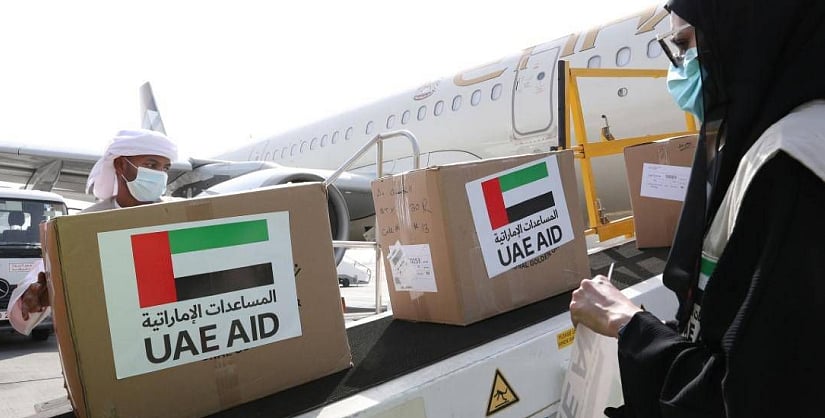UAE's strategic humanitarian efforts highlighted on International Charity Day
UAE has provided foreign aid exceeding AED 360 billion so far

Dubai: Every year on September 5, the world marks the International Day of Charity, declared by the United Nations in recognition of global humanitarian efforts aimed at supporting vulnerable communities and fostering solidarity and compassion among people.
The United Arab Emirates stands out as one of the leading nations that embodies these values in practice. Through its pioneering institutions, far-reaching initiatives, and comprehensive programs, the UAE has established itself as a global leader in philanthropy and humanitarian work—extending its support from within the country to communities across the world.
Institutionalised humanitarian work
The UAE government is committed to sustaining its humanitarian mission by extending aid to all those in need, including victims of earthquakes, floods, and conflicts across every continent.
The country has adopted an institutional approach to charity, building specialised entities to ensure sustainability and efficiency of its contributions. The International Humanitarian Affairs Council at the Presidential Court—chaired by Sheikh Dhiyab bin Mohamed bin Zayed Al Nahyan, Chairman of the Office of Developmental and Martyrs’ Families Affairs—oversees the nation’s global humanitarian portfolio, coordinating its leading initiatives and wide-ranging charitable and development projects.
Among the most prominent institutions is the Zayed Charitable and Humanitarian Foundation, established in 1992, which has provided aid to over 188 countries in education, healthcare, and humanitarian relief. The Khalifa bin Zayed Al Nahyan Foundation, founded in 2007, focuses on education, healthcare, urgent relief, and long-term development projects.
The Emirates Red Crescent plays a central role in regional humanitarian response, delivering emergency relief and development programs for the poor, refugees, and patients. The Mohammed bin Rashid Al Maktoum Humanitarian and Charity Establishment empowers youth, orphans, and people of determination through education, healthcare, and innovative initiatives, while Dubai Charity Association supports schools, hospitals, and clean water projects locally and abroad.
These organisations work closely with global partners such as the World Food Programme and the UN Refugee Agency (UNHCR) to ensure aid reaches the world’s most vulnerable regions.
Emergency relief and poverty alleviation in 140 countries
Since its founding in 1971, the UAE has provided foreign aid exceeding AED 360 billion, reaching more than 140 countries across five continents. Its support spans education, healthcare facilities, clean water provision, poverty and hunger eradication programs, and urgent relief in disaster and conflict zones.
In 2023 alone, UAE foreign aid totaled Dh11.7 billion, according to the Ministry of Foreign Affairs’ Foreign Aid Report. Humanitarian aid more than tripled compared to 2022, reaching Dh 4.9 billion—42% of total aid—while charitable assistance amounted to Dh 457.7 million.
The UAE has been at the forefront of major humanitarian crises: supporting Syrian refugees, delivering urgent medical aid to Yemen, Sudan, and Lebanon, and combating COVID-19 by sending millions of vaccine doses and medical supplies worldwide.
Transparency and regulation
To ensure aid reaches those who need it most, the UAE has enacted legislation regulating charitable activities. Federal Law No. 3 of 2021 governs fundraising, providing strict oversight and transparency mechanisms.
Government bodies, such as the Ministry of Community Development and local authorities, monitor fundraising and donations to uphold international governance standards.
Innovation and technology in humanitarian work
The UAE has launched advanced digital platforms enabling individuals and organisations to donate and participate in humanitarian initiatives, with tracking features ensuring that assistance reaches beneficiaries. Artificial intelligence and big data are also employed to analyse community needs and design targeted programs, ensuring sustainable impact.
The legacy of Sheikh Zayed
The UAE’s philanthropic mission is rooted in the vision of its founding father, the late Sheikh Zayed bin Sultan Al Nahyan, who made generosity a cornerstone of the nation’s domestic and foreign policy. He consistently affirmed that wealth is a tool to serve humanity, and that giving transcends race, religion, and language.
This legacy has been carried forward by H.H. Sheikh Mohamed bin Zayed Al Nahyan, President of the UAE, who has championed pioneering humanitarian initiatives and directed aid to millions worldwide—cementing the UAE’s status as a global hub for charity and relief, and a key partner in achieving sustainable development.
A global model of giving
As the world observes the International Day of Charity, the UAE stands out as an inspiring model of humanitarian action. Beyond providing aid, it adopts a strategic approach grounded in institutional planning, innovation, and international cooperation—contributing to sustainable development and fostering a more just and compassionate future.
In doing so, the UAE continues to reinforce the values of generosity, tolerance, and solidarity on which it was founded, remaining a beacon of hope for millions around the globe.
Sign up for the Daily Briefing
Get the latest news and updates straight to your inbox
Network Links
GN StoreDownload our app
© Al Nisr Publishing LLC 2026. All rights reserved.